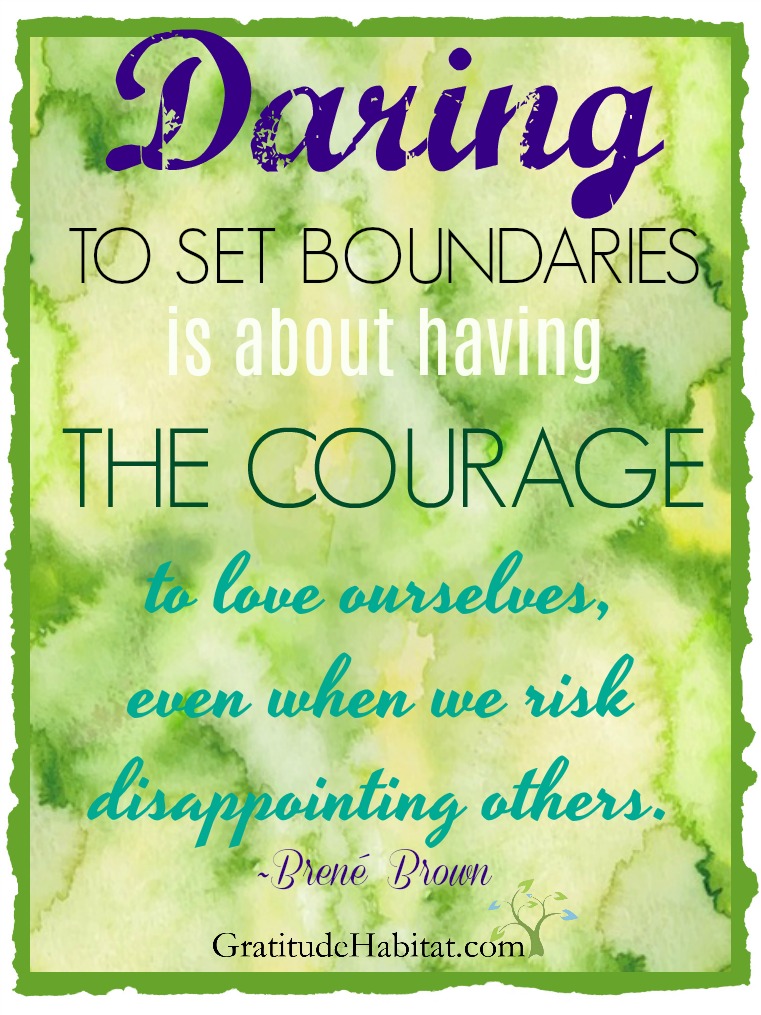Living In Gratitude: Setting Healthy Boundaries
Daring to set boundaries is about having the courage to love ourselves, even when we risk disappointing others. ~Brené Brown
Many of us lack boundaries in all aspects of our life. We allow others to make demands on us as well as our time without our permission. Instead, we acquiesce for fear of hurting someone’s feelings, being excluded, or simply out of obligation.
This absence of personal boundaries teaches others that we can and will do what they ask of us, no matter how inconvenient. And those same people will continue to test this lack of boundaries, always pushing to see if we will go one step further, put up with one more inconvenience, take on one more project at work.
One large contributing factor to a lack of personal limits is our smartphones, tablets, and computers. There is a prevailing belief that we MUST respond instantaneously to an email, text, social media post, or phone call. Being tethered to our devices keeps us at the mercy of others, enabling them to make demands on us anytime and anywhere.
Establishing unyielding boundaries are an indicator of our relationship with ourselves. These limiters are indicative that we value ourselves and firmly believe that we are entitled to determining what demands or requests we accept or decline. These personal restrictions shouldn’t be compromised or altered to fit different situations or relationships. Setting healthy boundaries helps reduce the drama, chaos, obligation, and stress the results from taking on other people’s problems or agreeing to participate in something that doesn’t serve us.
When we fail to set steadfast boundaries for ourselves, we openly allow others to take advantage of us. Establishing and adhering to healthy boundaries are representative of the respect for ourselves, our values, and our time. These restrictions do not mean we care less for others but rather that we are honoring our needs and standing up for ourselves.
If you are one of the many who don’t have limitations in place or whose boundaries are much more fluid than they should be, here are five steps to defining and implementing healthy personal boundaries.
- Identify your core values
Determine exactly what things are important to you in all areas of your life: work, family, friends, romantic relationships, etc. This step is not about avoiding or trying to appease others but should be about you. They should focus on things that allow you to minimize stress and anxiety, allow creativity and productivity, and maintain a sense of personal satisfaction and stability.
- Change yourself not others
We can’t change the behavior of others but we can alter how we react to and deal with situations and people. Our boundaries can help. We can set our limits to help us not get upset or angry at others when they make what we feel is an unreasonable request that we think we have to abide by.
- Predetermine the consequences
Now that you’ve established some personal rules to live by, you must also decide what you will do if and when someone disregards those boundaries. Knowing these consequences in advance keeps you from giving in to them “just this once” or being in a situation where you simply don’t know how to respond.
For example, if one of your personal boundaries is not allowing other people’s tardiness to make you late, you can set a consequence that if someone is 15 minutes late or more, you will go without them.
- Behavior speaks louder than words
Realize that people will push, ignore, and disregard your boundaries even if they’ve been informed of them. And, you may be tempted to give in. Don’t. In these cases, your behavior of living up to your established boundaries speaks much louder than words.
If one of your rules is not responding to texts regarding work after 7pm or on weekends, and someone who has been informed of this in advance texts you during this “off period,” do not respond. Instead, stick to the rules you’ve set for yourself and reply to them when it fits your predetermined schedule.

- Communicate your boundaries and the consequences clearly and stick by them
Even after we set boundaries, people will continue to push them. Knowing this, it is vital that we determine consequences in advance and communicate them clearly (and kindly) to others. When you communicate these consequences to others, do not do so in a manner that is rude or feels like you are giving an ultimatum.
For example:
“To allow me to spend time with my family, I don’t take calls or texts after 8pm. If you text or call me after this time, I’ll get back to you the next day.”
“Being on time is very important to me. I’m happy for us to go together but if you are more than 15 minutes late, I’ll head out and we can meet there.”
“I understand you’re upset right now but if you continue speaking to me in that tone, I will hang up/walk away until you have calmed down.”
By informing others of our boundaries and what will occur if they push them, we stand up for ourselves and reaffirm that these limits are immovable. When we tell someone that the consequences are one thing yet we do another, this shows them that we don’t really mean what we say. As such, they can and will continue to push our boundaries and chip away at them.
When we set and stick to healthy personal boundaries and associated consequences, we can transform our lives. By taking control of our lives rather than allowing others to manipulate us, we will be less stressed, annoyed, worried, and upset. Healthy boundaries create a sense of peace and control over our lives as we stand firm in our core beliefs and values.
May your day be filled with gratitude and good things.
![]()







